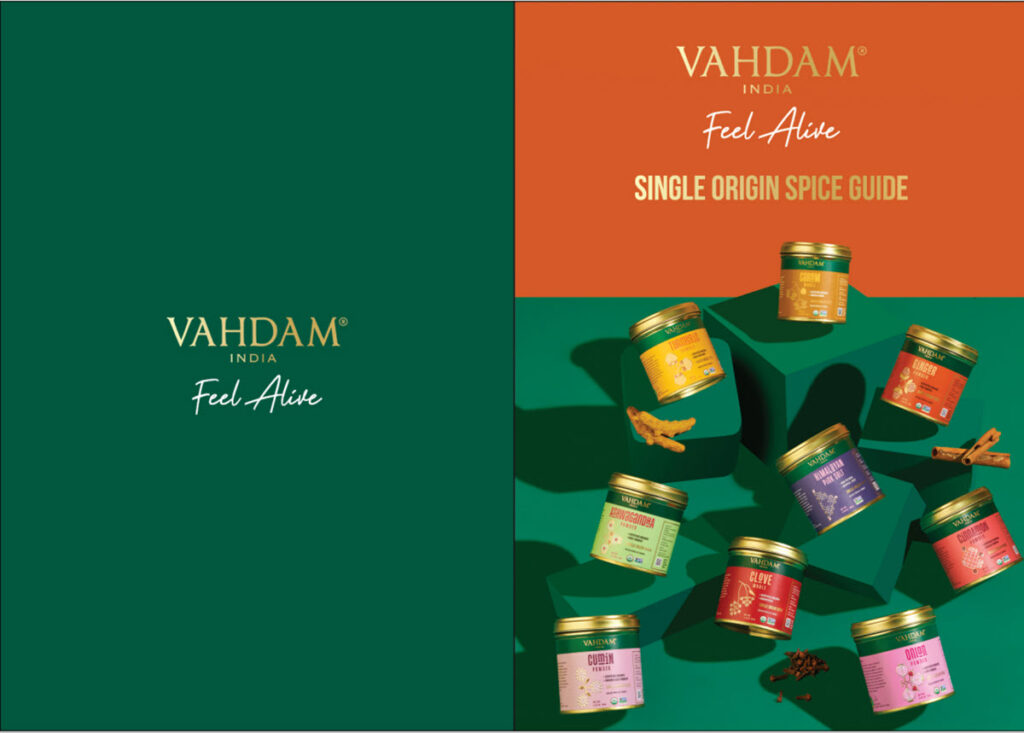Vahdam Tea founder Bala Sarda is launching a new line of 25 Indian spices grown free of adulterants and pesticides and manufactured without artificial colors. Initially, Vahdam spices will be sold directly to consumers and later offered in grocery stores.
Listen to the interview
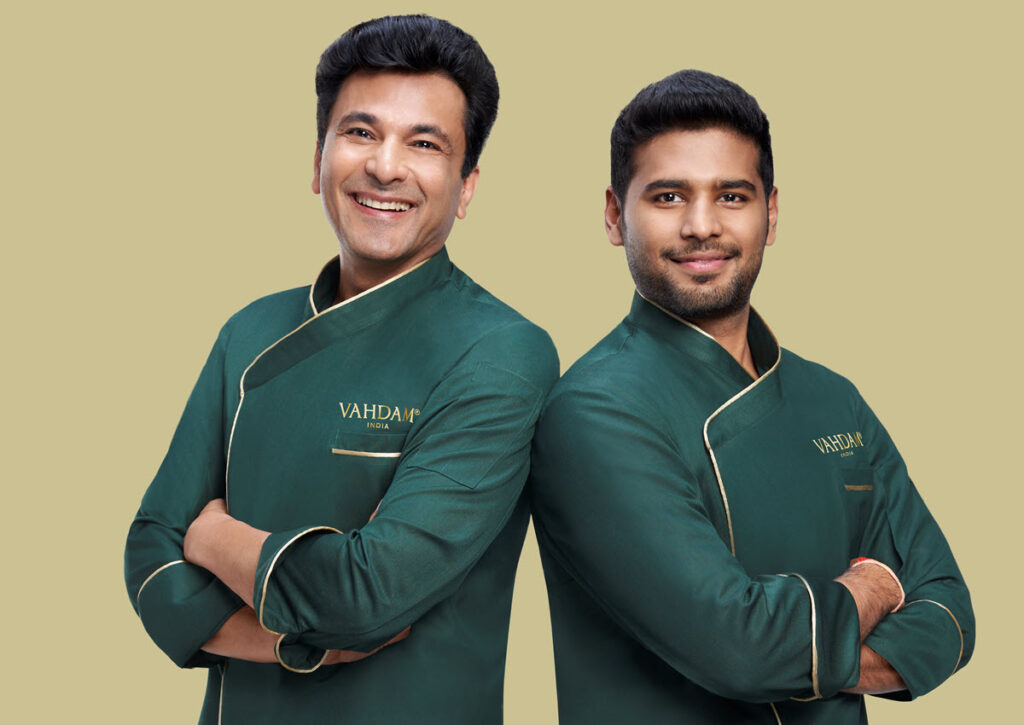
Bala Sarda’s Vahdam Tea turned eight this year. From launching Vahdam as a brand that connects tea drinkers with producers to a range of superfoods with turmeric, moringa, and matcha, Vahdam’s journey has been about an Indian brand offering consumers across the world what they want, direct from the source. The latest addition to the brand is a range of Indian spices, now offered not unlike their tea. We talk to Bala about the new launch and what it means for Brand Vahdam.
Aravinda Anantharaman: Thank you, Bala, for joining us here at Tea Biz. I know it’s a busy time for you. But first, congratulations on all the developments and in particular the launch of Vahdam Spices. How did that come about? And how does that fit into the larger Vahdam Brand?
Bala Sarda: Thanks, Aravinda for having me on the show. Excited to be here. I think this is just to give you a sense of our vision and our dream with which we are trying to build the brand, right from the early days that I started this almost eight years back, in 2015. This month will actually turn eight. And from day one, I think one of the key things we identified, Aravinda, was this incredible opportunity, which India as a country offers. I think if you really look at a product like tea, as we all know, India is one of the largest producers and exporters of tea in the world. In fact, almost a quarter of the world’s production of tea happens in India. You look at tea-growing regions like Darjeeling, Assam, and the Nilgiris, these are GI indications, right? Just like Champagne and Cognac in France. I think we genuinely know that there’s a consensus among connoisseurs that India grows the finest tea in the world.
We looked at a category like spices even early on, where, if you look at the stats, India is the largest producer and exporter of spices in the entire world. We have the largest variety of spices we make as a country. If you look at some of the more popular variants of spices, say turmeric, 80% of the world’s turmeric is actually made in India and the list goes on and on. Yoga, Ayurveda… there is so much India has to offer and I think, very early on, we realized that all these products are being exported from India at single-digit margins. There is no Indian brand or there is no brand at origin, which is, adding value and taking this product to consumers in global markets. There is no innovation in the category, Of course as we know right supply chain was extremely broken. There were multiple middlemen, right from a farmer in India to consumers sitting even across the world And that just told us that there is an opportunity for us as a brand to solve and make available a much better higher quality, fresher product to consumers.
Lastly, and most importantly, tea is also, the largest employer of labor in India. You add spices to it, this is potentially the largest employer of organized labor in India. And India is the most populated country in the world now, according to some stats. I think this is a massive, massive industry we are talking about that has been, plagued with stagnancy right? The farmer’s costs have not gone up, and the prices of tea and spices have not gone up. Everybody wants to come out of this industry. Estate owners want to shut their estates down or sell them even though this is such an amazing business on the consumer-facing side of things. This is such an integral part of consumers’ life in all these markets. And I think the biggest reason for that again was that there was no value addition. And there was no homegrown brand, which was taking it taking it to the world.
So, just like tea, where we said, hey, can we cut down the middleman, source direct, process it, bring innovation to the product, to our supply chain, and make available a much better product to consumers through the power of the internet? I think the crux of everything we do at Vahdam is the internet. I think it’s truly democratized global consumer brand building because today’s sitting out of India, a brand like Vahdam can you know, can sell to over 3.5 million consumers globally, which I think was unimaginable right before the internet came in. So of course, the bedrock of our distribution is the Internet.
So when you combine all of this, the gap in the market, the opportunity to make available a better product plus obviously a strong differentiated brand story, that is obviously high trust with origin brands, you know all French wines, Scotch, chocolates, anything and everything that we’ve grown up, believing that origin products are more trusting And third is the internet is how we sort of built business in tea for the last eight years.
That said, I think we were fortunate to have a tremendous response, And I think there were two, or three signals, which got us to get into spices. First of all, Aravinda, a lot of our teas have spices as an ingredient in them. In fact, a lot of our herbal teas that don’t have tea, it’s basically a concoction of different spices. In addition to that, we launched this very innovative range of turmeric teas back in the day in the US which is widely popular across markets.
Very early on I think a lot of our consumers started emailing me and telling the team that while they love the quality of our spices and they consume tea, they do not have an alternate option, which is as good when they want to, use it for say, lattes, for their cooking, for curries so on and so forth. And that got us thinking that there is a tremendous opportunity even in the spices market for applications, which is non-tea, right? So that is something we’ve been receiving as customer feedback for the last three years, if not more.
Second, if you look at the brand, Aravinda, the long-term vision of Vahdam is to take the best of India to the world, right? Going back to why we started, what we are doing with Vahdam was, can we take the best of India to the world under a proud, ethical, sustainable, homegrown label? After getting some stability in tea, if I can put it like that, we said, hey, what’s the second category we can get into and you know, probably create an impact near to what we are trying to do in tea? This is what has got to think of spices as a very, very natural progression, right?
I’ll give you a small example. We did this brand study to understand what consumers think of us selling spices. A lot of those consumers thought Vahdam is already selling spices. So, that just tells you that the perception was always this is a brand, which is bringing the best of India to the world, and that again, you know, just reinforced our, our vision of, getting into spices.
And lastly, and most importantly, I think, over the last three years, we have spent a lot of time like tea in building the supply chain. We work with a lot of direct farmers, and cooperatives. Unlike tea, I would say spices are slightly more disorganized. You will see a lot many smaller farmers versus, you know, like a Darjeeling is 87 estates. So I would call it organized versus, you know, somebody growing tulsi to see in Utter Pradesh, you know, there will be thousands and thousands of farmers doing that, right? So bringing them together, with the consistency, the quality… Of course, it’s a product, which is exclusively available outside India. So obviously there are several parameters around the use of pesticides, the product being organic, the product being pesticides and toxins free, right? So I think we spent a lot of time over the last three years or more. In fact, because of tea, we had started using it, but we got very, very serious about it in the last 24-36 months in the spices categories as well. And then we were sure that we have something that we can scale is when we decided to you know, finally get into spices around our 8th Founders Day.
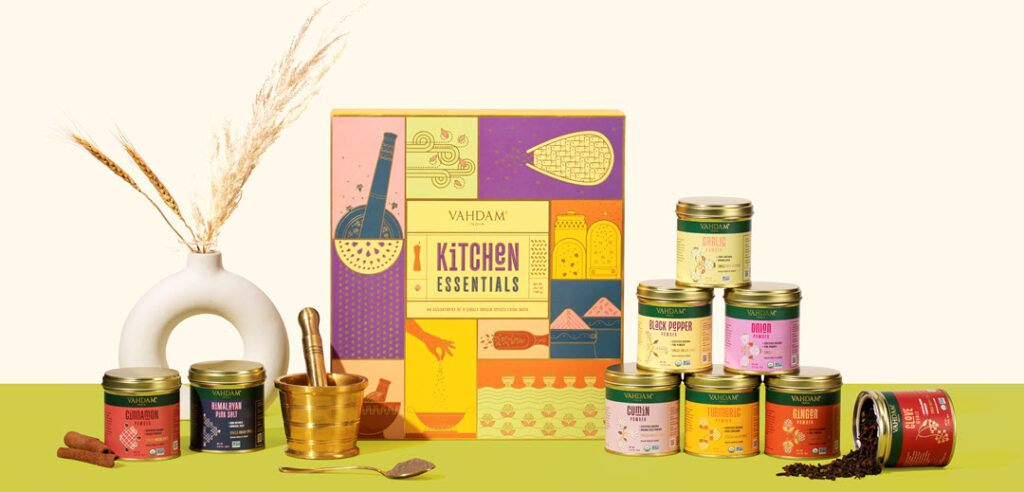
Aravinda: You talked about the supply chain innovation, you talked about the product innovation. So what were the lessons you were able to bring from the journey you’ve had with tea into spices?
Bala: I’ll start with product innovation. First-time entrepreneurs can be very naive and I’ll be very, very honest with that, right? Sometimes you think you have, you have created a product. And there is a demand for that. One of the things which I learned in my journey at Vahdam Teas, building the tea category which we still, I think it’s still very, very early days and we’re still building that, so, don’t get me wrong there, but I think was, how do you listen to your customers more, right? So here I think instead of believing what we can make available to customers, which is what we did with tea in the early days, here, everything was customer-driven.
The signal for us to get into this category came from customers which we, then obviously took that signal, went very deep, probed our current customers, and did multiple studies in the market to first, understand: Should we do it? If we do it, what are the kind of products we need to do? What are the real challenges in this category? And then we identified trust as a big deficit. There was a big trust deficit, especially for products coming out of India. You would have a foreign label branding it is as packed in America. Obviously, the tea, the spices being Indian, which was still being accepted. But, again, like what I saw with tea early on as well, right, we saw that with spices. We, very early on, realized that, how do you build amazing trust with the customer and you know he is going to be super critical around, everything we do. And of course, having the Vahdam brand equity made a big difference in helping us do that.
But from a product side of things, I’d like to give you a small example. We work with organic-certified farmers across India. Most of our spices are certified organic whichever can be and we will try to keep it that. Despite the fact that we also want to work with a lot of small farmers who on paper have absolutely toxin and pesticide-free products but which time we potentially certified organic because if you have one acre of land just the cost of certification is so high. So we also want to support them. We build trust by, you know, ensuring that all our spices are tested in European labs, which are considered to be the most, the highest standards in terms of testing parameters and just the sensitivity of that instruments around the product. So I think a lot of these things were, very, very critical to us getting to the product. And what’s our brand positioning, what’s our go-to-market? What do we communicate to our consumers? And I think that that’s the one learning, I think all of this, we did was actually based on all our learnings you got in the tea category and things we went wrong or fumbled rather several times in our journey, building the tea category, that would be number one.
And on the supply chain piece, I think, Aravinda, I think, to be honest, I believe it’s a playbook we are trying to build, right? If you look at tea and spices, I think the only fundamental difference was that spices were a slightly more tougher and disorganized category, versus even tea. But I think the principles of our supply chain, which is, how we ensure we source direct from farmers. How do we cut out middlemen? How do we ensure that we sort of address the fragmented supply chain? How do we ensure that there is enough no matter where you source it from?
All our spices are packed in our own facility. Like tea, we source, process, blend, and package 100% of our spices within our facility today. It’s BRC Certified A grade facility in the NCR region near the Delhi airport and ships it out to consumers.
Investing in the supply chain early on can give you long-term results is again, something we knew very, very closely. So I think broadly no real learnings in the supply chain piece because that’s really what we had done. Probably right in tea and… you know just how do you scale that up and do it in slightly different categories is really the challenge we are addressed since the last 24 months.
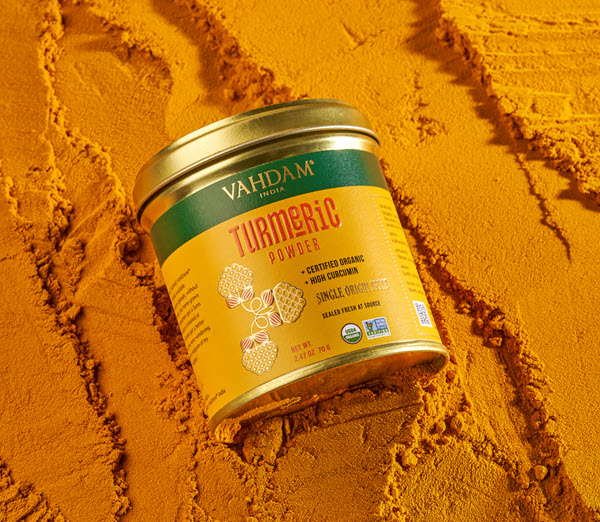
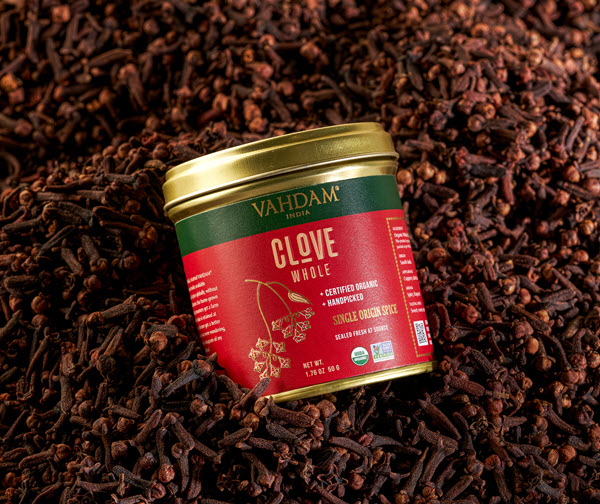


Aravinda: Why have Indian spices not been marketed as single-origin spices? Is it because it’s also a commoditized segment?
Bala: Two reasons. I think one definitely I think it’s been very, very commoditized. The category, the product has been extremely commoditized over the years, even though it’s an amazing, such an important part of our lives. It adds flavors, spice, and so much life to your kitchen, to your food, and to everything you consume right. And a lot of things that don’t even come on that level of impact in your life still have been marketed better. I think it was just about somebody, you know, taking that step and trying to, at least market the product better. And, that’s really, the first understanding we had. That it’s a commoditized market but it’s very, very important to the consumer, which means that has the potential to sort of create a differentiated brand positioning in this category. And that’s what we really trying to do.
And second, I think India grows the best spices in the world. I think that is absolutely no doubt. Again not because I run now, a category of spices through our brand, but I think if you compare it, I think there’s a general consensus among chefs all over the world, among food connoisseurs, and enthusiasts that the flavor, the aroma, the density of oils, just the quality of Indian spices is phenomenal. And when that is there, I think it makes sense to help market the origin. Why can’t a Lakadong turmeric not be as popular as the Darjeeling first flush or a Kerala cardamom or a Telicherry black pepper be as popular as a black tea from Assam? I think it’s it all comes down to making that high-quality product available, consistently branding, it positioning it and just ensuring that there is trust and trust is built by just doing the right thing several times over and over right for several years. That’s really what we vision to do with spices. And I think if we can do that, I believe, Indian origin spices can really stand, gather a lot of real estate even in foreign retailers and of course most important in the minds of our mainstream consumers in these markets.
Aravinda: The Western market is an important focus market for you, isn’t it? When will you launch spices for India?
Bala: I think on a lighter note. I think, like our strategy, the 24 hours a day has also been consistent and that is not changed. So I think it is just a matter of, to be very honest, I think it just been a matter of focus. Like tea, right? It was always about when we will do India rather than if we will do India. And I think just give him the bandwidth, the depth of the market, and the impact we can potentially create with the time and the resources we have as a team. We just realize that it is more efficient and more effective to sort of focus on some of these markets first. And that’s really what we did with teas. And that’s exactly, you know, what we are trying to do with spices as well. But that said, I think, you know, once we are able to get some understanding we are able to create some impact and foreign markets. Of course, we will end up coming and launching in the India market also, hopefully soon.
Aravinda: Has the choice of people you’ve sought for brand endorsements and partnerships been about building trust? With spices, you have Vikas Khanna. What was the thought behind this partnership?
Bala: This is our first – I don’t even use the word commercial because Vikas is genuinely and truly a fan of Vahdam. He was our consumer even with teas and when he got to know about spices, he was like, we have to do this together and we sort of collaborated, even though there is a commercial collaboration to a small level there. But before that, till today, I think every endorsement right from Oprah [Winfrey] to Ellen [Degeneres] to Mariah Carey, Nicole Scherzinger very recently, these are 100% organic or revenue share partnerships where these more people who were fans of the brand and that’s why like I said. And we’ve been very lucky and fortunate to have been able to get our products to them. And them appreciating the brand, the story, and everything we are doing. And so that in tea, all these partnerships you see are 100% organic and I can say that on the record because they are. With spices, as I said, we were very sure that it is a category that is foreign to tea, right? Vahdam is considered as a tea brand and we’re doing that transition. So I think to sort of put that message out, we wanted a slightly higher impact, in terms of knowing the kind of people we can reach and the noise we can create. And that’s number one.
Number two, as I said, I think trust is very, very important, to the entire process, right? And a Michelin Star chef, a MasterChef judge is launching a brand of spices, which is native to his country, I think stays a lot somebody who’s been pretty much approached by any and every country and every spice company in the world, or at least from India.
And then third is, I think no better way, you know, to take Indian spices to the world with the man who’s actually, who’s been at the forefront and the flag bearer of taking Indian cuisine, Indian aromas, you know, to a modern consumer and to the mainstream audience in markets like the America right? Like the US. I think absolutely, you know, no brainer for us to work with him and you know and we hope you sort of continue this partnership for a long-term basis.
Q6: How will the spice segment expand? What’s in the pipeline?
Bala Sarda: I’m in the firstly very, very excited to be doing this. I think it’s an incredibly large opportunity. We are very, very passionate about taking India under a proud, ethical homegrown label to the world. And, you know, I think, and taking it to consumers, with spices, we can also get much more from a consumer’s day because you spend so much more time cooking and eating your food. So, I think that’s, that’s really very, very exciting for us. And, driving us to sort of do this and try and make this successful but from our from a product perspective like I said, right? We’re coming out with almost 20 to 25 single-origin spices in the first phase, that’s really what we’re doing. So the best of Indian single-origin spices, right? From your turmeric to ginger to black pepper, clove any, or every spices you spice you can think of. Right from Himalayan rock salt. A chili powder from some several, several spice-growing regions in India. And in addition, to that, in the next phase, you will see a lot of spice mixes and seasonings coming from our portfolio, which is basically a pre-made concoction. I think it’s gonna be the same spices we’re selling a single origin but you know for people who like their spices in a certain ratio as a certain concoction you know our spice blends and our spice mixes right from a chai masala to a lot of these Indian taste to even some very modern American flavors, you know because ultimately the application needs to be for an American or a European and a mainstream consumer to actually use it in, in his or her daily life. So you will see a lot of that also, coming from us. And lastly, it’s very important to position the category in a certain way I think for far long, I think, the spices category has not been disrupted, and the spice box is still a very boring part of your kitchen. We want to sort of enlighten that. We want to make it colorful, we want to add a lot of color, brand, and storytelling to that. And you will see you know, assortments and gifts and all of that also coming from our portfolio, like what we did with tea, to sort of just ensure that, consumers perceive this product in a much better way than they do today,
The dream rather is to actually create this platform of high-quality Indian products. Create an entity, create a brand that is really trusted, which is consistent, which is, which is as per global brands. Taking India as a brand and making that more trusted ultimately is really, what makes us very, very passionate. Obviously, it’s a great feeling when you see an Indian brand selling in a Bloomingdales or a Whole Foods Canada or a Sprouts Farmer’s Market, which is packed in India, from India. And I think that’s really what drives us every day. So, I think, like tea, spices are an absolute Indian category, and we deserve a global player creating impact in this category, not only in the US, not only in Europe, but pretty much all countries globally. Because like I said, 80% of the world’s turmeric comes from India. Most of the world’s ashwagandha comes from India. And these are, these are life-changing spices. These are spices, which can help you live a better life, better lifestyle, your mental health… So, there are also a lot of strong wellness connotations attached to spices like tea. I think it’s just very exciting for us to take this, from India to the world. And we will do everything it takes to make this available to consumers and hopefully make it worth their while.
Aravinda: There was tea, then there were superfoods, and now spices. Is Brand Vahdam a story that’s still being written?
It is, Aravinda. I think we’re probably in the second chapter, and probably hopefully it’s a longer book than we would also imagine. I think one step one step at a time. And I think for us, two critical goals are – how do we ensure everything we are doing in tea and how do we go deeper in that while at the same time we make spices a success. From our product market fit perspective, this is really what we are focusing on this year. And hopefully, you’ll see more coming out from our umbrella over the next year or so.
